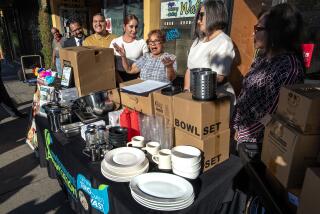Biodegradable Products Enter Olympic Arena
- Share via
Among the companies going for gold at the Olympic Games underway in Sydney, Australia, this week is Biocorp of Redondo Beach.
The $4-million company is supplying biodegradable straws, cutlery and drinking cups for the two-week event in a high-profile test of Biocorp’s products.
Made from corn and potato resins, Biocorp’s utensils are three times more expensive than plastic dinnerware. Users save money on disposal because waste can be sent to composters instead of to landfills, said Biocorp Chairman and Chief Executive Frederic Scheer.
“And they can say they are green,” Scheer added.
One customer, the University of Massachusetts, said composting costs $42 a ton compared with $65 a ton for trash disposal. The university uses Biocorp’s biodegradable bags in food-service operations at its Boston campus, and is testing the utensils at the same location.
Waste collection at a large event like the Olympics is complicated. Olympic planners have installed pink disposal containers at the event specifically for Biocorp’s products, Scheer said. There are color-coded receptacles for other trash.
Scheer expects 70% of Biocorp’s waste to end up as compost. At a trial-run of the program at the Australian Grand Prix in Melbourne last March, 80% of the waste was recycled or composted, according to the trade publication Stadium & Arena Management.
A former merchant banker and leveraged buyout veteran, Scheer, 45, hopes a successful Olympics will spur equity investment in the 3-year-old company. So far, $6 million has been invested in privately held Biocorp, which is not profitable.
The Olympics won’t directly help the bottom line. Scheer said Biocorp is taking a slight loss on the Olympic deal, which is worth about $1 million.
“It’s huge in terms of visibility and demonstrating these products can be used in everyday life,” said Scheer, who counts among his previous deals the sale of a 120-unit hotel chain to Days Inn in the late 1980s.
Companies that make biodegradable containers have had a difficult time building a business. Santa Barbara-based EarthShell, which went public at $21 in early 1998, has lost $165 million since its November 1992 inception. Its shares closed unchanged Tuesday at $1.69 on Nasdaq. The company, which supplies clamshells to 128 McDonald’s Corp. restaurants, has experienced production glitches and delays.
“It is not so much market acceptance,” said EarthShell marketing director Donna Balinkie. “Commercialization is the challenge.”
EarthShell, according to public documents, is defending itself in a patent infringement suit filed by Italian chemical company Novamont, which develops resins used in biodegradable products.
Novamont, meanwhile, a former client of Scheer’s, granted Biocorp rights to distribute some of its resins in the United States. Biocorp is not party to the EarthShell suit, Scheer said.
More to Read
Go beyond the scoreboard
Get the latest on L.A.'s teams in the daily Sports Report newsletter.
You may occasionally receive promotional content from the Los Angeles Times.






